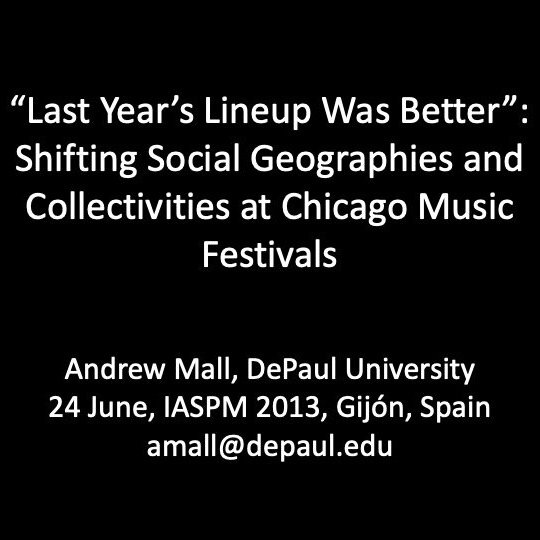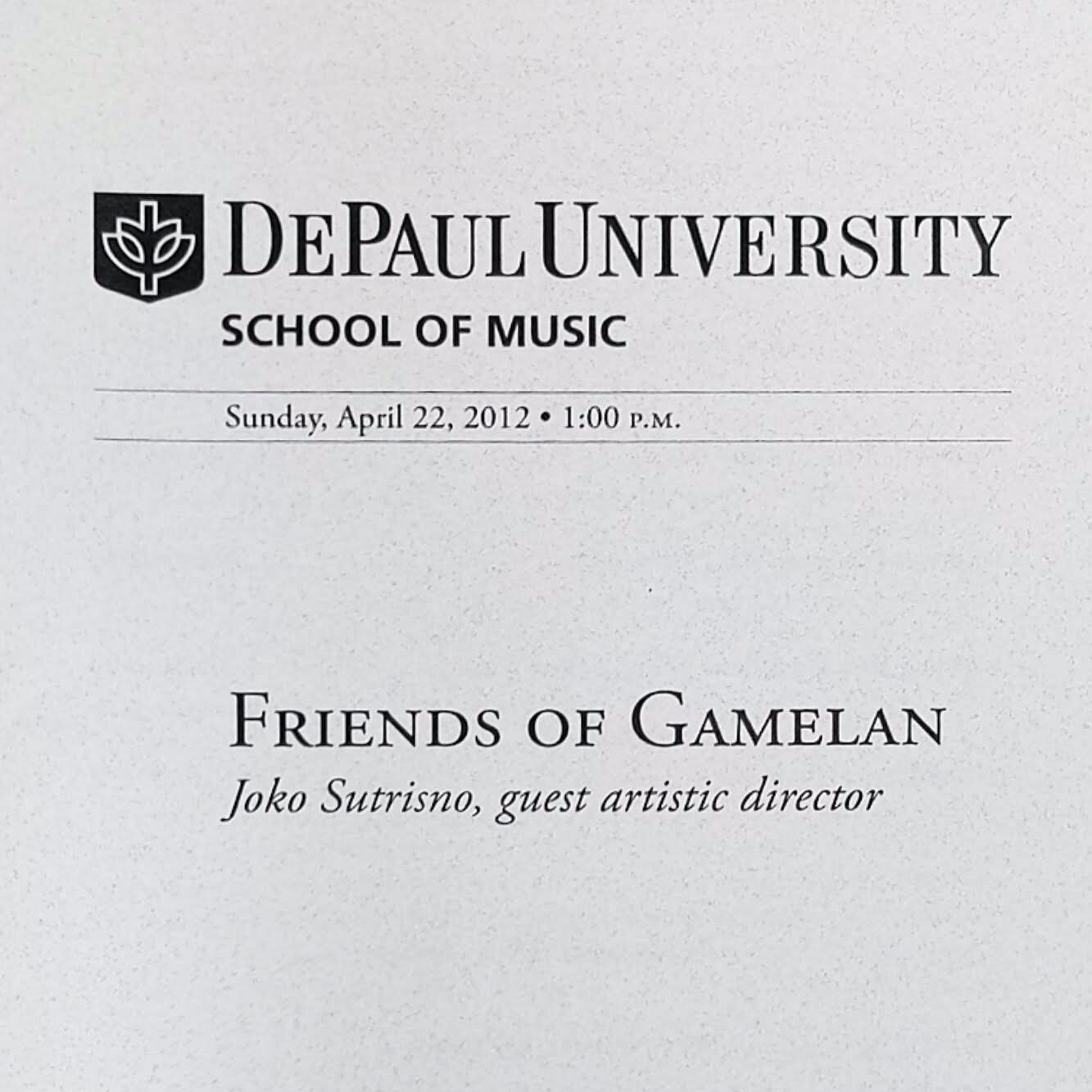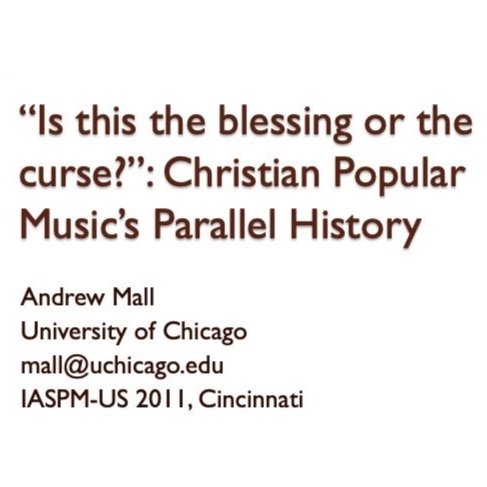
Histories and Industries: Music and Research in the Age of Digital Reproduction
HAIKU conference presentation (2014). A greater, more comprehensive historical understanding of our music industries can both increase our potential as scholars to enact and affect real change outside of the academy and our students’ potential to succeed in whatever area of musical inquiry, performance, or mediation they choose.
Music, Technology, and Audiences
Technology has been central to the production, distribution, and consumption of music throughout the history of the contemporary music industry. Electronic instruments and recording technologies expand the creative possibilities for artists; media—both in their broadcast and commodity forms—provide opportunities and challenges to music publishers, labels, and distributors; creative and business synergies are found by partnering with other culture industries; and interactive technologies disrupt the top-down industrial paradigm. This course examines the history and socio-cultural contexts of several specific technological developments in the music industry.

Disruptions in the Music Industry
Organizations and individuals in the music industry have long had to balance predictable and successful business and artistic practices against the need for innovation. Changes in such diverse areas as consumer taste, communications technology, copyright law, and recording media function as broad external forces that have preceded and predicated disruptions in the music industry: shifts that significantly alter both the ways in which business is conducted and the music industry’s landscape at large. In this class, we will examine several such case studies in-depth, with a goal of understanding the precedents, circumstances, and ramifications of disruptions throughout the history of the music industry.

Christian Popular Music, U.S.A.
The Canterbury Dictionary of Hymnology, Canterbury Press (2013). Christian popular music is an umbrella category for a sonically diverse repertoire of late twentieth- and early twenty-first-century evangelical Protestant commercial popular music. It encompasses several distinct subcategories based on musical genre, industrial context, or function including, but not limited to, Jesus Music, Contemporary Christian Music (CCM), Praise & Worship music, and Christian rock.
Billy Ray Hearn
The Canterbury Dictionary of Hymnology, Canterbury Press (2013). A visionary and innovator in the Christian music industry, Hearn is primarily known as the founder of Sparrow Records, currently a part of the Capitol Christian Music Group family of record labels and distributors owned by Universal Music Group, a subsidiary of media conglomerate Vivendi.

Subculture as Liturgy: Resistance and Worship among Subcultural Christians
Christian Congregational Music conference presentation (2013). Based on several years’ of ethnographic research, this paper examines the musical practices of two subcultural Christian communities in the U.S.: Nashville’s Anchor Fellowship and western Illinois’s Cornerstone Festival. Music and congregational song are very important to these liminal spaces, challenging old boundaries and defining new ones. Subculture itself becomes liturgical, and the political potential of corporate worship and popular music is often made explicit. In illustrating these communities, their sounds, and their ideologies, this paper both demonstrates the utility of subcultural theory to the study of congregational song and challenges Hebdige’s dialectic of incorporation.

“Last Year’s Lineup Was Better”: Shifting Social Geographies and Collectivities at Chicago Music Festivals
IASPM conference presentation (2013). Drawing on many years of ethnographic research in Chicago, Illinois, this paper compares and contrasts several civic and commercial popular music festivals, such as Blues Fest, Cornerstone, Jazz Fest, Lollapalooza, and Pitchfork. I use mutable, multi-dimensional center-periphery theory to illustrate and explain the social flows within festival spaces, the differentiating strategies of festivals, and the compromises that emerge when organizers reconcile their needs with their audiences’ expectations. In examining the intersecting and overlapping representations of mainstreams and undergrounds at music festivals, my paper contributes to research on the political economies, social geographies, and taste communities of popular music events.
Music of Southeast Asia
In this course, we will examine the ways in which communities, their representation(s), and musical life are interrelated throughout Southeast Asia. How might musical activities affect communal bonds organized around shared experiences and histories of colonialism, nationalism, religion, and tradition in Southeast Asia? What roles do musical commodities, economies, identities, and subcultures play in contemporary Southeast Asian cultures? To what degree is Anderson’s idea of the imagined community useful to scholars of musical life in social worlds that are both increasingly globalized and increasingly fragmented?
“We Are Called Here to Worship Together”: Ethnographic Outsiderness and Insiderness in Religious and Popular Culture
SEM conference presentation (2012). In this paper, based on several years of ethnographic research at the Anchor Fellowship, I address the challenges of fieldwork as a religious outsider and cultural insider. In constructing a rich description of an Anchor worship service based on my observations, those of church-goers, and formal interviews of Anchor pastors, this paper confronts the multivalence of experience and the interpretation thereof, demonstrating the importance of phenomenology to ethnography of religious and popular cultures.
Discover/Explore Chicago’s Music Scene
This course introduces students to the diverse musical offerings in the Chicago metropolitan area. Students will learn about the wide variety of music- and arts-related activities across many genres and styles. In addition to the excursions taken during Immersion Week and throughout the Fall Quarter, class discussions will focus on topics central to understanding Chicago’s music scene in both its historical and contemporary contexts.

Christian Rock
Encyclopedia of Popular Musics of the World, Continuum (2012). the emergence of Contemporary Christian Music (CCM) in the early 1970s as the dominant category of popular music marketed to white evangelical Christians, there have been Christian recording artists whose music has failed to meet the aesthetic, contextual, economic, ideological, lyrical, stylistic or theological requirements of the US CCM recording industry. Early ‘Christian rock’ artists’ theological message located them on the periphery of the secular popular music recording industry, while their aggressive sound—heavily influenced by contemporary rock music—located them on the periphery of the existing Christian music recording industry, which focused primarily on sacred music and hymnody.


Friends of the Gamelan Concert
Friends of the Gamelan concert, April 22, 2012 (DePaul University)
Beginning Central Javanese Gamelan
Our beginning central Javanese gamelan ensembles course provides a practical introduction to the colotomic (structural) and balungan (melodic skeleton) instruments in a typical ensemble. We primarily focus on pieces in the lancaran and bubaran forms (Yogya and Jakarta traditional repertoire) because their shortness and repetitiveness are both useful for familiarity with new instruments.
Introduction to World Music
In this course, we will examine the social and cultural role of music(s) and musical experiences around the world, with special attention to the role of music in discourses regarding multiculturalism in the United States. How does music structure individual and collective identity? How do aesthetics, ideals, politics, and values shape musical experiences? How might we begin to understand culturally- and contextually-specific attitudes towards localism and globalization, appropriation and syncretism, individual and collective interests, exclusion and inclusion, art and commerce, resistance and conformity through music?
The Price of Profit? Changing and Challenging Priorities in the Christian Recording Industry
SEM conference presentation (2011). In this paper, I examine EMI Christian Music Group (CMG), a major Christian record label (and division of EMI Ltd.), headquartered near Nashville, Tennessee. I provide a value-neutral analysis of the intersections of commerce, aesthetics, and theology. As with Keith Negus’s (1992, 1999) ethnographic research within the recording industry, my study illustrates that major record label practices and priorities are more nuanced than may be visible to outside observers.


“Is This the Blessing or the Curse?” Christian Popular Music’s Parallel History
IASPM-US conference presentation (2011). In this paper, I examine the historical forces that shaped the CCM industry as separate and distinct from the mainstream industry, and consider how these forces have also contributed to the relative absence of scholarship on Christian popular music within popular music studies’ canons. I rely primarily on historical and ethnographic research on the Christian popular music recording industry undertaken for my dissertation in 2009–2010.
Search and navigate extras
- 1A
- AAR
- Agence France-Presse
- AMS
- Amy Grant
- ARSC
- awards
- Baylor University
- Beer & Hymns
- Beyonce
- Birmingham
- Boston
- Brown University
- Cambridge
- capital
- CCM
- CCMC
- Chicago
- Christian rock
- Christianity Today
- CNBC
- community
- congregational music
- crossover
- DePaul University
- discography
- DIY music
- DJ
- emo
- Entertainment Weekly
- ethics
- festivals
- Furnace Fest
- Future of Pop
- Fyre Fest
- gamelan
- God Rock Inc
- Grammys
- hardcore
- IASPM
- IASPM-US
- introductions
- K-Pop
- Keith Green
- Kendrick Lamar
- Larry Norman
- Las Vegas
- Live Nation
- MEIEA
- methods
- MIDSEM
- Money 4 Nothing
- music industries
- Nashville
- New England Conservatory
- Newsweek
- Northeastern Global News
- Northeastern University
- Nylon
- Oasis
- Ottawa
- panels
- Philadelphia
- podcast
- Pop Con
- Portland Press Herald
- PSN
- punk
- radio
- record labels
- Rock Hall
- Rock That Doesn't Roll
- SAM
- San Antonio
- scene
- SCM
- SCSM
- SEM
- sing-alongs
- SMT
- Spotify
- streaming
- subculture
- Super Bowl
- survey
- Taylor Swift
- television
- The Quicky
- Ticketmaster
- TicketNews
- TikTok
- TIME
- Tufts University
- Universal Music Group
- University of Chicago
- University of Pennsylvania
- vinyl
- Washington Post
- Whitney Houston
- worship
archives
- May 2025 6
- April 2025 2
- March 2025 1
- February 2025 3
- January 2025 2
- December 2024 4
- November 2024 2
- October 2024 1
- September 2024 1
- August 2024 3
- June 2024 3
- May 2024 1
- April 2024 5
- March 2024 2
- February 2024 6
- January 2024 2
- December 2023 4
- November 2023 2
- October 2023 4
- September 2023 1
- August 2023 1
- July 2023 1
- May 2023 1
- April 2023 2
- December 2022 2
- November 2022 1
- October 2022 3
- September 2022 3
- August 2022 1
- May 2022 1
- April 2022 1
- March 2022 2
- January 2022 1
- November 2021 1
- October 2021 3
- September 2021 3
- August 2021 2
- July 2021 3
- June 2021 2
- May 2021 6
- April 2021 11
- March 2021 2
- February 2021 2
- January 2021 2
- December 2020 1
- November 2020 3
- October 2020 1
- September 2020 1
- July 2020 1
- March 2020 1
- February 2020 3
- January 2020 1
- December 2019 1
- November 2019 4
- October 2019 1
- August 2019 1
- July 2019 1
- June 2019 1
- May 2019 1
- April 2019 1
- March 2019 4
- January 2019 2
- December 2018 1
- November 2018 1
- October 2018 2
- September 2018 1
- May 2018 1
- March 2018 3
- December 2017 1
- November 2017 2
- October 2017 1
- September 2017 2
- May 2017 1
- March 2017 1
- February 2017 1
- December 2016 2
- September 2016 1
- May 2016 1
- March 2016 1
- February 2016 1
- December 2015 1
- November 2015 2
- August 2015 2
- April 2015 1
- March 2015 2
- November 2014 1
- September 2014 1
- May 2014 1
- April 2014 1
- January 2014 1
- November 2013 1
- October 2013 2
- August 2013 1
- June 2013 1
- March 2013 1
- November 2012 1
- August 2012 1
- May 2012 2
- April 2012 1
- March 2012 1
- January 2012 1
- November 2011 1
- May 2011 1
- March 2011 1
- January 2011 1
- November 2010 1
- April 2010 1
- November 2009 1
- May 2009 2
- April 2009 1
- October 2008 1
- April 2007 1
- November 2006 1
- May 2006 1
- April 2006 1